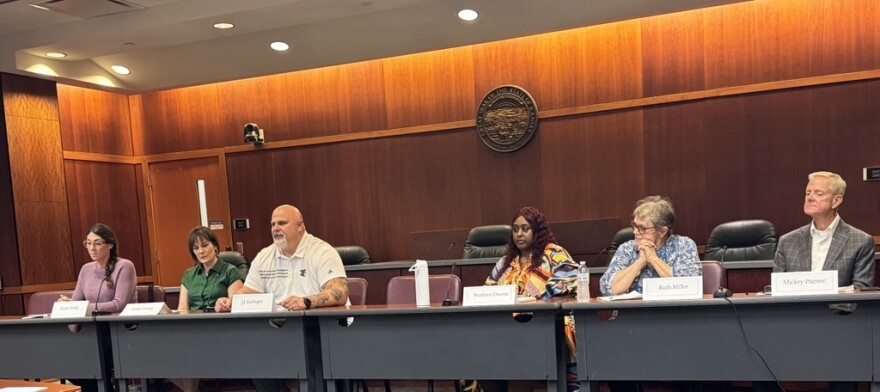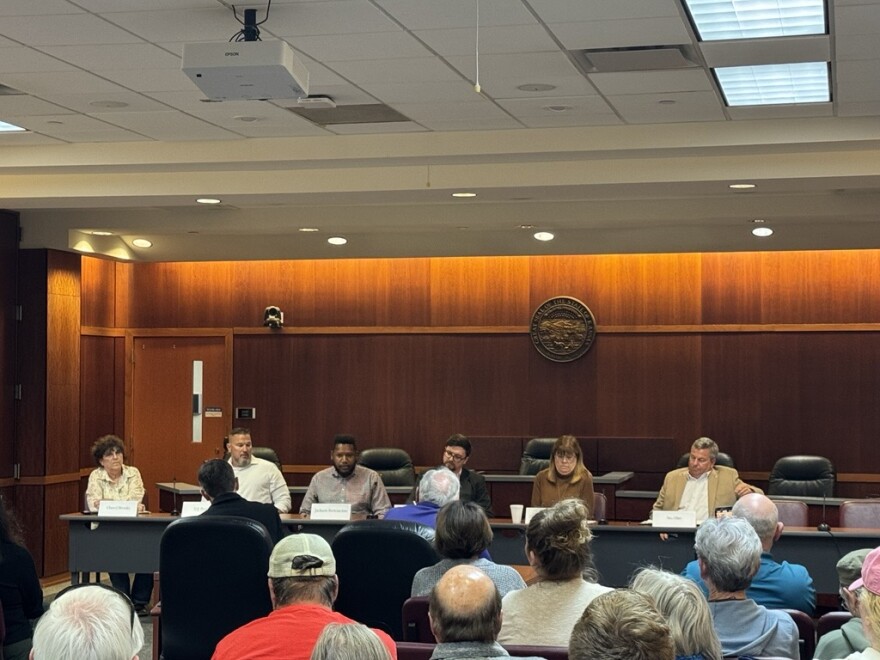On Monday, the Pittsburg Chamber of Commerce and Morning Sun Newspaper moderated a candidate forum for the Pittsburg City Commission and USD 250 Board of Education in the Nov 4 elections. Chamber President Blake Benson moderated the event, with the Morning Sun’s Ron Womble filtering questions from the crowd.
The forum was split into two parts - one hour for the City Commission and the next for the Board of Education.
City Commission Candidate Forum
Three candidates are running for re-election to the city commission: Dawn McNay, Stu Hite, and Cheryl Brooks.
Each year, the commission votes to select a mayor, and this year it chose McNay. She's one of the longest-serving commissioners.
Candidates running for the first time include Jackson Bertoncino, Isaiah Harris, and DJ Perry. Harris and Bertoncino are both young candidates; Bertoncino graduated from Pittsburg High School in 2017.
The candidates were given six questions in total. Three ahead of time, and three from the crowd. Each candidate had 90 seconds to respond to each question, with two minutes for the opening and closing statements.
The main points of discussion were rising cost of living and affordability, childcare shortages, funding for essential services, increased taxes and job creation.
Prepared question: What are the most significant challenges facing the city of Pittsburg over the next three years?
The primary focuses of each candidate's answer to this question were the cost of living, taxes, and housing affordability. Several candidates highlighted the need to reduce taxes and the out of control cost of living."Our taxation window is also driving up the cost of living. It's getting ridiculous," said Perry. "So we need to look at that and focus strongly on how to reduce the taxation in a modern, effective way."
Finding housing for people employed in Pittsburg was mentioned. According to candidate Bertoncino, 70% of Pittsburg is currently zoned for single-family housing. He said this limits renters' options.
"I think it's important that we are providing the full range of housing that meets everyone's needs, whether you're working to buy a house, rent, or you're homeless," he added.
Harris split the challenges into the immediate and medium terms. The short-term challenge is “cuts to nonprofits that are so critical to success,” like the recycling center, humane society, and SEK-CAP.
Each candidate, especially Harris, echoed childcare affordability as one of Pittsburg's main challenges.
‘What I want to see from the city is to really have a paradigm shift in thinking about these issues as key areas of economic development for our city,” Harris said.
McNay assured the audience how exactly the budget process works.
"The budget process the city uses uses data and commission input to guide decisions, and the city's work is transparent," she said.
Hite pointed out that while taxes are disliked by many, they're what "pay for the services that we all expect and demand as citizens of the community."
"It's not just about here and now and answering the call of different requests that come forward, but it's also about looking to the future as well," he added.
Prepared question: Where do you see Pittsburgh in 10 years, and what specific steps will you take during your term to help us get there?
In his opening speech, Bertoncino mentioned that he grew up in the area and attended high school and college in Pittsburg. He wants the same for future generations 10 years from now.
"10 years from now, I want Pittsburg to be the place that when someone graduates from high school or college here in Pittsburg this is the first place they choose," he said.
One of Harris' main talking points for each question was affordability for housing - he sees a more affordable Pittsburg in 10 years and wants “more creative approaches.”
"Over half of Pittsburg's housing supply was built before the year 1970. So many are outdated and unaffordable, unavailable here," explained Harris.
McNay applauded both Harris and Bertoncino for their candidacy and shared vision.
Cheryl Brooks is the third incumbent candidate running for re-election. In the next 10 years, she "would like to see us [the community] give more back, just not just take."
"It is about the growth, but it's also about the people and making sure that the people can afford to live here, and we can't always take from the people all the time," she said.
Brooks and her husband are small business owners and understand how a budget functions and how it impacts future planning.
Perry wants to "see his kids thriving in the community 10 years from now."
The next phase of the forum involved answering audience questions.
Audience question: What can a city commissioner do, specifically? What would you do? What is your plan to make Pittsburg more affordable?
McNay said "she's proud of what Pittsburg is doing to expand housing at all income levels."
"That is, a unique way that we've been able to do that. Hopefully that's an evergreen fund that will continue to build,” McNay said.
According to Brooks, affordability means different things to many people.
"Depends on whether you're living within your means, whether your paycheck, you're keeping the taxes down so you have more money in your wallet," she explained.
USD 250 Board of Education

The second hour of the forum was for the candidates running for three seats on the USD 250 Board of Education. Six candidates are running: Emily George, Emily Smith, J.J. Karlinger, Shaileen Owens, Ruth Miller, and Micky Painter. Keith Kloster told KRPS he is unable to run due to health issues and couldn't withdraw his filing.
Painter is the only candidate running for re-election.
Nearly all of them have a personal connection to USD 250, whether as a parent, former educator, or longtime resident.
The main points of discussion in the forum were future budget cuts, supporting parents and ways to increase teacher retention.
Prepared Question: What do you see as the primary responsibility of a school board member? And is there a particular issue that motivates you to serve on the board of education?
George answered first. Since deciding to run, she's attended school board meetings and realized they frequently discuss the budget.
"I think that the main responsibility of a school board member is to listen to the community, the values of the community and the values of the school, and to take that into consideration," she said.
She'd like to strengthen parent-teacher relationships. According to George, strong parent-teacher relationships will decrease behavioral issues and increase success.
Karlinger is a coach, former law enforcement officer, and parent. The primary responsibilities, according to him, are to support the needs of students and teachers, and to align with the priorities of residents.
"We want to take it all to, you know, whether it's the cooks, whether it's the custodians. And the bus drivers, all of these people are really working their hardest to do the best for our students, and we need to make sure that they get the support that they deserve," Karlinger said.
Karlinger called himself a proud Pittsburg dragon. He wants to "give back to something that's given me so much."
Each candidate agreed that the district budget is the board's top priority.
Prepared Question: What are the three strengths of USD 250?
Candidates highlighted students' achievements, the diversity and quality of teachers, and community partnerships.
Owens brought up the diversity in clubs and organizations offered to kids.
" I think it's important for other kids to see kids that look like them," she added.
Miller applauded the facilities, grant writers, and programs as a strength of USD 250.
Painter was next in line. He said the teachers and the current superintendent are among the district's strengths, as well as the clubs and sports.
"Statistics have shown that if a student is connected with even one group, maybe a gaming group, it may be theater or debate or whatever it is, they are more likely to stay in school and graduate," said Painter.
Smith pointed out teachers run clubs and extracurriculars out of their love for the clubs.
"So I feel like our teachers are doing an excellent job, and that is probably the main thing," said Smith.
Candidates also highlighted the connection and proximity to Pittsburg State University.
Question Three: What do you see as the top three challenges for the school district over the next five years?
Low student enrollment, budget cuts and student mental health and wellness were the main answers to this final prepared question.
Owens said preparing for low student enrollment is a key challenge in the next five years. She’s a Vice President of TFI, a foster care agency in Pittsburg, and wants to ensure that the school district has effective mental health services.
"We know that when kids have good coping skills right and they can be able to explain to someone how they're feeling, they're going to do better," said Owens.
According to Painter, special education funding will take a big hit over the next five years.
"Some of the top challenges I have, it really has to do with money," he said.
He said that when enrollment is down, it directly affects the district's funding, which in turn affects the ability to provide quality “programming.” In other words, it's a domino effect.
Karlinger emphasized allocating funding in a way that makes the most impact. He also highlighted teacher and student retention.
"We want to make sure that our students can see themselves and that their prospects are right," he added.
The rest of the time was spent answering audience questions.
Voters will decide on the City Commission and USD 250 Board of Education seats on November 4. Early in-person advance voting began on October 15. KRPS interviewed several of the candidates about their campaign and vision for the position if elected.
Copyright 2025 KRPS. To see more, visit Four States Public Radio.





